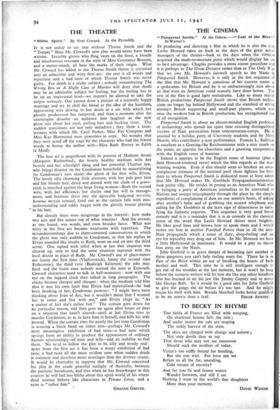THE CINEMA
Pimpernel Smith." At the Odeon.—,, East of the Rive At Warner's.
IN producing and directing a film in which he is also the star, Leslie Howard takes us back to the days of the great actor. managers of the theatre—back to the days when the virtuoso acquired the made-to-measure piece which would display his art to best advantage. Chaplin provides a more recent precedent and it is perhaps to The Great Dictator rather than to The Only Way that we owe Mr. Howard's farewell speech to the Nazis in Pimpernel Smith. However, it is only in the last sequence of the film that Mr. Howard is conscious of his current status as a spokesman for Britain and he is so embarrassingly nice about us that even an American could scarcely have done better. The rest of the film is good light melodrama. Like so many recent British productions Pimpernel Smith shows that British techni- cians no longer lag behind Hollywood and the standard of acting amongst British supporting and small-part players, which was once the weakest link in British production, has strengthened out of all recognition.
Pimpernel Smith is about an absent-minded English professor of archaeology who spends his spare time rescuing distinguished victims of Nazi persecution from concentration-camps. He is assisted by a holiday party of University students and by Mary Morris, wh3 -contributes a neat performance. Francis L. Sullivan is excellent as a Goering-like Reichsminister with a nice touch on the piano, an appetite for chocolates and a gnawing exasperation with the English sense of humour.
Indeed it appears to be the English sense of humour (plus a little Howard-rendered verse) which the film regards as the war- winning weapon. Even if this should seem to betoken an over- complacent estimate of the national peril those fighters for free- dom to whom Pimpernel Smith is dedicated must at least admit that Mr. Howard makes Dr. Goebbels Propagandaministerium look pretty silly. He strides in posing as an American Nazi who is bringing a party of American journalists to be converted to Nazism and sweeps triumphantly through the place by the simple expedients of complaining of dust on one sentry's boots, of asking after another's baby and of grabbing the nearest telephone and calling for Dr. Goebbels at the least sign of dilatoriness in satis- fying his fantastic requests. This sequence is very good broad comedy and it is a reminder that it is in comedy in the classical sense of the word that Leslie Howard shines most brightly. He likes good lines and knows how to speak them and I would rather see him in another Petrified Forest than in all the anti- Nazi propaganda which a sense of duty, deep-feeling and an eye for topicality may drag out of him. In Mr. Howard we have a little Hollywood in miniature. It would be a pity to throw him away on the Nazis.
John Garfield is in grave danger of becoming just another of those gangsters you can't help feeling sorry for. There he is in East of the River within an ace of breaking the hearts of both mother and moll. This time he is still intelligent enough to get out of his troubles at the last moment, but it won't be long before the scenario writers will let him die like any other hoodlum who has learned to set his jaw like Jimmy Cagney and to move like George Raft. So it would be a good idea for John Garfield to give the gangs the air before it's too late. And he might rescue his moll with him. Brenda Marshall looks better qualified


























 Previous page
Previous page